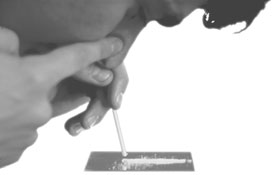
 Collection
CollectionDrugs: the complete collection
All Effectiveness Bank analyses to date of documents related to use and problem use of illegal drugs starting with the analyses most recently added or updated, totalling today 815 documents.
![]() Click blue titles to view full text in a new window
Click blue titles to view full text in a new window![]() Use the selectors at the bottom to turn to the next page in the list of documents
Use the selectors at the bottom to turn to the next page in the list of documents
HOT TOPIC 2018 HTM file
Opiate-blocking implants: magic bullet or dangerous experiment?
Ashton M.
‘Hot topics’ offer background and analysis on important issues which sometimes generate heated debate. Opinion is sharply divided on the ethics and effectiveness of long-acting implanted or injected opiate-blocking medications, products not approved for medical practice in the UK, but which some see as a major breakthroughs in overcoming addiction to heroin and allied drugs.
HOT TOPIC 2018 HTM file
Ethics and evidence on naltrexone treatment of offenders
Ashton M.
‘Hot topics’ offer background and analysis on important issues which sometimes generate heated debate. Opinion is sharply divided on the ethics and effectiveness of pressuring opioid-dependent offenders to take the opiate-blocker naltrexone. Especially sharp is the controversy over long-acting products not approved for medical practice in the UK. Do they constitute an unacceptable infringement of autonomy, or is forcing them on some offenders as caring as holding back someone about to (by choice or not) walk off a cliff?
STUDY 2012 HTM file
Does active referral by a doctor or 12-step peer improve 12-step meeting attendance? Results from a pilot randomised control trial
Manning V., Best D., Faulkner N. et al.
Drug and Alcohol Dependence: 2012, 126(1–2), p. 131–137.
In the context of current UK policy, this is a key study, testing the ambition to extend recovery beyond formal treatment by systematically linking patients to mutual aid groups, the main way it is being suggested commissioners can square the circle of doing more (recovery is seen as a whole-life transformation) with less.
MATRIX CELL 2018 HTM file
Drug Treatment Matrix cell D4: Organisational functioning; Psychosocial therapies
Ashton M.
Key studies on how treatment organisations affect the implementation and effectiveness of psychosocial therapies for drug dependence. See if you agree that “organizational climate underlies the entire process of innovation adoption”, appreciate the obstructive effect of high staff turnover and how to reduce it, ask yourself, “Is my service even ready for change?” – and explore whether change driven by money is just as good for patients as that motivated by a desire to improve their lives.
MATRIX CELL 2018 HTM file
Drug Treatment Matrix cell B4: Practitioners; Psychosocial therapies
Ashton M.
Seminal and key studies on the impact of the practitioner in psychosocial therapies. Takes Carl Rogers’s seminal theories as its starting point and guides you through the complexities which obscure the impact of client-worker relationships despite their patent important to the clients.
MATRIX CELL 2018 HTM file
Drug Treatment Matrix cell A4: Interventions; Psychosocial therapies
Ashton M.
Seminal and key studies shedding light on the general principles underpinning psychosocial therapies and the effectiveness specific approaches. ’Individualise,’ is the overarching theme … and the consequent dangers of inflexibly following guidelines and research findings.
STUDY 2016 HTM file
Extended-release naltrexone to prevent opioid relapse in criminal justice offenders
Lee J.D., Friedmann P.D., Kinlock T.W. et al.
New England Journal of Medicine: 2016, 374, p. 1232–1242.
Added to basic counselling alone, monthly injections of the opioid-blocking drug naltrexone helped prevent relapse among US offenders with a history of opioid dependence recently released from prison or under criminal justice supervision in the community – findings most applicable to those who prefer opioid-free to opioid-maintenance treatments.
STUDY 2015 HTM file
A double blind, placebo controlled trial of modafinil for the treatment of cocaine dependence without co-morbid alcohol dependence
Kampman K.M., Lynch K.G., Pettinati H.M. et al.
Drug and Alcohol Dependence: 2015, 155, p. 105–110.
Modafinil is a mild stimulant which it is hoped might plug the gap in effective pharmacotherapies for dependence on cocaine. Though this trial found that it promoted abstinence from cocaine, others have not, and its inconsistent benefits have been seen as failing to outweigh the drug’s side effects.
STUDY 2014 HTM file
Primary care-based buprenorphine taper vs maintenance therapy for prescription opioid dependence: a randomized clinical trial
Fiellin D.A., Schottenfeld R.S., Cutter C.J. et al.
JAMA Internal Medicine: 2014, 174(12), p. 1947–1954.
Among patients dependent on prescription opioids, ongoing maintenance therapy using a legal opiate substitute (buprenorphine–naloxone) produced better outcomes than tapered withdrawal, with patients less likely to have used illicit opioids and considerably more likely to have remained in their allocated treatment.
STUDY 1988 HTM file
Is the counselor an “active ingredient” in substance abuse rehabilitation? An examination of treatment success among four counselors
McLellan A.T., Woody G.E., Luborsky L. et al.
Journal of Nervous and Mental Disease: 1988, 176(7), p. 423–430.
The unexpected resignations of two counsellors at a US methadone clinic in early 1985 triggered a unique study of the influence of counsellors on their patients’ recovery. Its insight remains relevant today, and the study has been added to the Effectiveness Bank as a piece of ‘old gold’.
Select search results page